- Home
- Saul Tanpepper
Iceland: An International Thriller (The Flense Book 2) Page 11
Iceland: An International Thriller (The Flense Book 2) Read online
Page 11
Chapter Seventeen
Padraig signaled to pull off the road, explaining that they needed to stop for petrol and a bite to eat. He followed her to the bathroom and waited for her outside while she did her business, as if fearing she might run away.
She imagined what he'd do if she were to try. She was taller than him, and in better physical shape, if appearances meant anything. He walked with the slightest limp, and he rubbed his lower back frequently, as if it pained him, so she guessed he'd have a hard time catching her. She also figured he probably didn't do very much field work, not like Norstrom. He looked like he'd be more at home in an air conditioned office.
You're not so fit yourself, Angel.
He bought them a couple sandwiches from the deli cabinet and took them along with bottles of lukewarm soda to a table outside and sat down in the sunshine. He explained he needed a break from driving, saying he'd injured his back recently and slipped a disk. "I haven't been the same since. The pain medication makes me thirsty."
Angel sensed that he was telling her this for a reason, like he had guessed how she was comparing him to Norstrom, and it immediately made her feel guilty.
Watching him carefully unwrap the plastic from around the sandwich and take a bite, she worried he might decide not to tell her anymore. The dynamic that had formed between them in the car had shifted since they stopped.
"Why did Norstrom think the dead German border agents were proof of nanites?" she asked.
He chewed the food thoughtfully, then washed it down with a swallow of soda. "It's not really something you want to hear while eating."
She waited.
"Okay," he said, shrugging. "But what I'm about to tell you is highly classified."
She nodded.
"The documents Norstrom obtained reported that the bodies were either partially or wholly dissolved by an unidentified substance. The government's conclusion was that they had been killed by terrorists by dousing with acid. It was kept a secret to avoid causing a panic."
"Acid?"
"Terror groups use the method on occasion to kill prisoners. It's an extremely shocking practice, so naturally it has high impact value. They would drop people alive into vats of nitric acid and then disseminate the videos of their deaths. The acid is then used to make bombs. While Norstrom accepted that the German agents had been killed by terrorists, he believed it wasn't acid but nanites, just like we'd seen with the detainees."
"And he never took this to your bosses?"
Padraig shook his head. "He'd been burned too many times. He managed to convince them he was ready to return to the field on a new project. Ostensibly, he was looking into funding sources for terrorists operating in Europe, but when he asked me to partner up with him, I knew he was onto something more. Even so, I think it took him by surprise when you mentioned the nanites last night."
He took another bite and stared at the missing chunk for a long time. "I shouldn't be telling you any of this."
"I will say I tortured you for the information."
"And ruin my reputation as a tough guy?" He chuckled and took a drink. "Doesn't matter. I'm probably already off his Christmas list for what I've told you."
"I will send you a card. You and Pamela."
He studied her face, then nodded, apparently satisfied.
"There was one other incident you should know about. I never told him out of fear he'd take it to our employer, along with his suspicions, and it would be the end of his career. But I think we're beyond that now."
He wrapped the collar of his jacket tight about his neck. An unpleasant wind had picked up, chilling them.
"Four or five months ago, while Norstrom was still recovering from his injuries, the United States 6th Naval Fleet intercepted a cargo ship off the Libyan coast. The vessel was flying North Korean colors. At first, the crew refused a hail, so it was suspected of smuggling illegal arms. Instead, what the Americans found was people in the ship's hold, about a hundred— Libyans, Somalians, Ethiopians . . . . All men. All of fighting age."
"Soldiers? Terrorists?"
"Both were initially suspected. The Koreans claimed they were refugees seeking asylum in Italy. They had plucked them off a sinking boat and were just doing the humanitarian thing and transporting them to shore."
Angel snorted. "Out of the kindness of their heart."
"Undoubtedly. Anyway, no weapons were found. They even had the refugee boat on one of its winches. Since the United States has no legal authority to facilitate the relocation of refugees in the Mediterranean, they radioed the Guardia Costiera — the Italian coast guard — who then turned around and submitted a formal request back to the 6th Fleet for assistance. This provides legal authority for the US to act under NATO charter. A small complement of armed American seamen was transferred over to the Korean vessel and the remainder of the naval strike group carried on toward their target as scheduled. It all seemed routine. There was no hostility. In fact, all of the men were fully compliant during the entire process."
"Compliant or terrified. Maybe the Koreans were abusive."
"The crew was interrogated and found to also be fully compliant. I've seen the transcribed voice records. They all indicate the refugees were not treated poorly in any way. All were apparently in good health and had no complaints."
"How were you able to get access to all this?"
"I'm getting to that. When the Guardia Costiera finally arrived a couple hours later, they found everyone dead. Both crews — American and Korean — were brutally murdered. Blood was everywhere."
"What happened?"
He nodded. "Without witnesses, it's impossible to say how the incident precipitated. There was no sign of the refugees. They were gone, vanished— or so it was first believed."
"Hiding?"
He shook his head. "Since there were no bodies, the Italians claimed the refugees killed the crews and left on their boat, which was missing. All that was left behind was several dozen piles of rags on the deck. The material was soaked through with a large amount of unidentified organic substance that the Italians have classified as a petroleum-based caustic solution."
Angel's pulse raced. She knew where Padraig was going with this. "The bodies," she whispered. "They were completely liquefied."
He paused, pushing away the remains of the sandwich, his appetite gone. "The only identifiable bits left were a few teeth fragments. Of course, nobody knew what the hell had happened, so the ship was quarantined and an NBC team was dispatched to assess the scene. We went in on the assumption that it was some sort of new chemical or biological weapon, possibly parasitic."
"You?"
"I have a doctorate in genetic epidemiology and molecular biology."
She raised her eyebrows appreciatively.
"And you thought I was just another spy with rugged good looks."
"Norstrom says you're not spies," she said, trying to cover up her laughter.
"That's right." He chuckled, then quickly sobered up. "Collectively, the team was unable to reach any conclusion as to the nature of the solvent."
"But you think it is the same thing as the German border agents?"
"I didn't know what to think, only that it couldn't be tiny destructive machines in their blood. In fact, after hearing Norstrom's wild theory, I tried my damnedest to find some other explanation. I even checked for viral hemorrhagic fever. But the best I could do was determine that the unidentified material had been created by some form of chemical process."
"And the crews? You said they had been brutally murdered. Their bodies weren't dissolved?"
Something flashed in his eyes, and Angel knew he didn't want to tell her. Suddenly she didn't want him to.
"If there is one thing that disputes Norstrom's theory, it's this: The crew members were torn apart, not microscopically, as you would expect with nanites, but viciously, as if they had been attacked by animals. Their flesh had been pulled off the bones and shredded."
His face blanched as the imag
es she realized he must have seen flashed through his mind.
"It appeared at first glance as if they'd all been hit by large caliber gunfire, except very few rounds had actually been expended, and all of the shell casings were small caliber, mostly handguns." He swallowed dryly. "We found teeth marks on the bones. Human teeth marks."
She didn't know what to say. She could accept Norstrom's explanation that the nanites could somehow disassemble a body at the molecular level. She could even see them self-destructing afterward. It made sense, as Norstrom had tried to claim, that the company would do everything in its power to protect itself and its intellectual property. But how did the crewmembers' deaths fit in? Nanites wouldn't do the things Padraig said happened. They didn't have teeth.
It was the one inconsistency that brought Norstrom's theory to its knees.
Padraig's face tightened as he checked the time on his phone. "We had better get going."
Angel stood, glad to have an excuse not to talk about it anymore. She was sorry she had asked. "Do you want me to drive for a while?"
"You'd give up the whole back seat? No, I think I'll make it."
She laughed tightly, and the sound of it startled her.
"I can see why Norstrom likes you," Padraig said, pushing himself up from the table. He winced and cracked his back. "You're tough but compassionate, and you're very down to earth."
As they were returning to the car, their attention was drawn to a young couple at the adjacent fuel pumps. The two were in the middle of a bitter argument. The man had the girl by the collar and was shaking her, shouting at her to go inside and get him some beer. He sounded German, though he was speaking English.
Angel stopped, and Padraig took hold of her arm. "It's none of our business, luv."
The young couple were dressed in filthy jeans, the fabric torn and riddled with holes. Their shirts were in a similar decrepit state. The woman's hair, shockingly white save for the roots, had random streaks of pink in it. Both of them had multiple body piercings and tattoos. And they were obviously intoxicated.
Angel stepped away from them, following Padraig's lead, though she continued to watch the pair. Without warning, the man elbowed the girl across the face. She fell backward, slamming against the side of their car. Yet she somehow managed to stay on her feet.
She let out a bitter howl and launched herself at him, swiping at his face. Blood rose on his cheek and neck. Some of it sprayed onto the fuel pump. He also stumbled, but didn't fall.
"Angel," Padraig hissed. "Let's go."
The man spun around, grabbed the girl and threw her to the cement. Her chin hit the edge of the fuel pump island, eliciting an involuntary cry from Angel's throat. The man was on the girl a half second later, crouching over her and screaming. His fist rose up. Then came down with a sickening smack. Then it rose up again.
Before Angel could react, Padraig was there, grabbing and twisting the man's arm behind his back. They both went down, Padraig driving the air from his chest with his knee. The man cried out, but it was muffled, as his face was pressed against the cement. His neck was beet red, the tendons taut with rage. The girl crab-crawled away, shrieking profanities at them both.
Padraig ignored her. He bent down and growled something into the man's ear. When he didn't respond, he wrenched his arm even higher until he squealed in pain. "Ja, ja!" he cried, writhing beneath Padraig's knee. "Okay, ist gut! Aiee, scheisse!"
The girl had gotten up by then. Blood streaked her face, ran down her neck into her shirt. She started pulling on Padraig, trying to get him off her boyfriend. Failing that, she spat on him, then kicked him in the side.
Angel saw the flash of pain on his face and his body spasm. She could hear the owner of the petrol station shouting at them, saying he had called the police. Angel still couldn't move. How could it be that the couple had been punching each other not more than fifteen seconds before and now the girl was defending the man who beat her?
"Get off him, you fucking pervert!" she screamed. "Get off, god damned cocksucker!"
Padraig pushed her away and calmly rose to his feet. He reached up and wiped the spittle from his face. Then he turned to Angel and gestured for her to get into the car.
A police siren rose in the distance.
As they hurried out of the lot and back onto the road, Angel turned around to watch. The stupid girl was helping the boy to his feet. "Günter! Oh, my poor Günter," she kept saying.
Stupid American girl, Angel thought.
Günter looked dazed for a moment, then shrugged the girl off him. When she tried to touch his bleeding face, he slammed his fist into her nose and she reeled back onto the cement. The police car pulled into the lot a moment later.
"Are you okay?" Padraig asked.
Angel turned back around to the front. She was shaking like a leaf. "Yes."
"Good," he panted. His face was white as snow, and his forehead was covered in sweat. "Because, as soon as I can, I'm going to pull over. I may need some help getting out."
"Out? Why?"
"So that you can drive."
Chapter Eighteen
Alvin Cheong stood inside the private maintenance bay at Keflavik Airport and stared out into the storm. Wind battered the sheet metal, rattling it against the building's steel framework.
"Commercial air traffic is grounded," his pilot said. "We could still get out if we begged, but—"
"No." Alvin waved him off. "We'll wait."
He didn't really want to go up in this weather anyway. It wasn't worth the risk, neither to his stomach nor his life, not for what he intended to do. The dead weren't going anywhere.
But the living . . . .
Anyway, there was no hurry. The l'Enfantine woman was occupied with her charity work in Paris. The house was empty.
Also, oddly enough, he wasn't really looking forward to getting back out into the world. The past month of near isolation had been surprisingly refreshing, a nice break from his nonstop schedule of the past two years. He'd even gone on a bit of a news cycle diet.
Inertia, he thought. It was easier to keep moving when that's all he was doing, but now that he'd been in one place for a while, it was hard to get back into that routine.
"Internet says it's sunny on the continent," the pilot said.
"Of course it is. It's probably sunny a mile off the coast."
The man chuckled and went back to whatever it was he had been doing before. He had some sort of kit open and pieces strewn all over the floor on a tarp. He would lift an item and carefully wipe it down with a cloth, then gently set it back into the case. Alvin watched him for a moment, then turned back to the small, squarish window in the door.
Sleet had begun to pile up in the corners and was slowly covering the outside of the glass. He rapped a gloved knuckle on it, hoping it would fall away. Some of it did, sliding down and taking more of it with it until it disappeared out of sight. Most stayed, accumulating, then collapsing beneath its own weight before growing again. At the rate the stuff was coming down, the window would be entirely covered in an hour's time if it held. He half-hoped the storm would last at least three times as long, and half-feared it might last much longer.
Emily had warned him at breakfast that the weather might be an issue. "It's always an issue," he'd replied, "especially around this time of year." But now he regretted his slapdash reply. He'd grown much too familiar with the girl. He reminded himself not to get too close. She was much too fragile, and even the most seemingly insignificant slight could set her convalescence back by months, if not years. It might even destroy her. He'd invested too much in her to see it all undone. Better to not give her any false ideas.
If they had flown out earlier, they would have missed the storm. But there was an issue with one of the two Cessna's jet engines, a minor problem in one of the injection sensors. But it was enough to delay their departure and give the cold front time to build once it reached Iceland.
They watched it come. The newsmen showed it sweeping
over the Arctic from Siberia, bringing unseasonably cold temperatures. As it tangled with the blob of warmer air sitting over the island, it triggered turbulent winds and that rare phenomenon of winter lightning and thundersnow.
The warmth turned the precipitation into sleet, which partially froze in the frigid wind. The mushy stuff piled up on the roads and runways, melted and ran off. But as the storm persisted, the temperature continued to drop.
It was times like this that he missed the Gulfstream G550 that was his usual mode of transport. It wasn't so much that the larger jet was roomier, although that helped, but that it felt so much more sturdy in the air. It also required two pilots.
The much smaller Citation CJ3 provided for his work in Iceland made more logical sense, but he could never relax inside of it. He always felt like a lone sardine rattling around in a tin can, and with each shake he couldn't help imagining the skin of the plane peeling back just like one, despite the pilot's assurances that the aircraft was one of the safest small jets in the air.
But regardless which plane it was, the weather always had the final word. And in Iceland, fair weather could turn foul without warning at the drop of a hat.
"You should sit down, have something warm to drink," the pilot told him. His name was David Greig. Cheong didn't know him very well. The man had been assigned to him a month ago, when 6X finished construction and began the final preparations for stocking the bunker and assigned Cheong to oversee the process.
Grieg knew nothing of this, of course, nor did he seem all that interested in Cheong's reasons for being on the remote northern spot of land. Nevertheless, Cheong worried that the man's coolness and formality toward him was personal. He knew that Grieg's usual clientele were high tech executives and the occasional spoiled celebrity. He didn't want to be grouped along with them. He didn't like the idea of being seen as one of them.

 Open Wide
Open Wide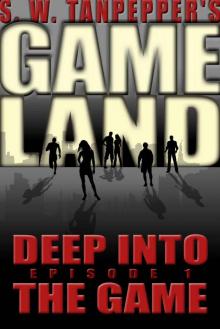 Deep Into the Game: S.W. Tanpepper's GAMELAND (Episode 1) (Volume 1) (S. W. Tanpepper's GAMELAND)
Deep Into the Game: S.W. Tanpepper's GAMELAND (Episode 1) (Volume 1) (S. W. Tanpepper's GAMELAND)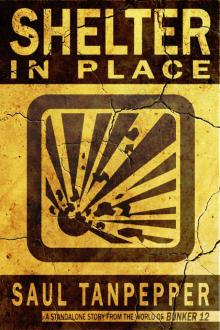 Shelter in Place: A short story from the world of BUNKER 12
Shelter in Place: A short story from the world of BUNKER 12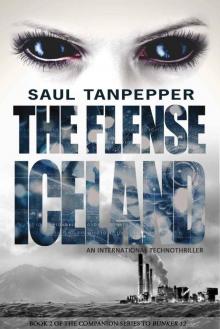 Iceland: An International Thriller (The Flense Book 2)
Iceland: An International Thriller (The Flense Book 2)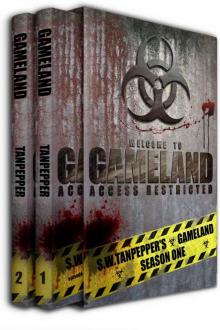 GAMELAND Episodes 1-2: Deep Into the Game + Failsafe (S. W. Tanpepper's GAMELAND)
GAMELAND Episodes 1-2: Deep Into the Game + Failsafe (S. W. Tanpepper's GAMELAND)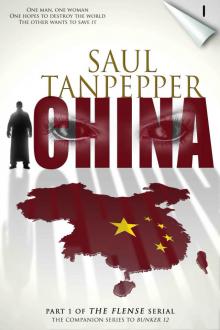 THE FLENSE: China: (Part 1 of THE FLENSE serial)
THE FLENSE: China: (Part 1 of THE FLENSE serial)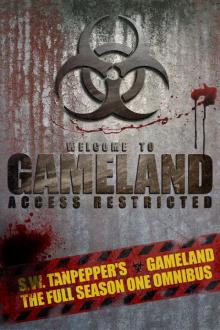 S.W. Tanpepper's GAMELAND, Season One Omnibus
S.W. Tanpepper's GAMELAND, Season One Omnibus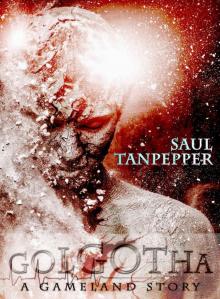 Golgotha: Prequel to S.W. Tanpepper's GAMELAND series (S. W. Tanpepper's GAMELAND companion title Book 1)
Golgotha: Prequel to S.W. Tanpepper's GAMELAND series (S. W. Tanpepper's GAMELAND companion title Book 1)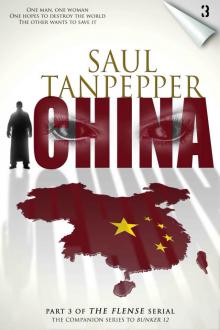 THE FLENSE: China: (Part 3 of THE FLENSE serial)
THE FLENSE: China: (Part 3 of THE FLENSE serial)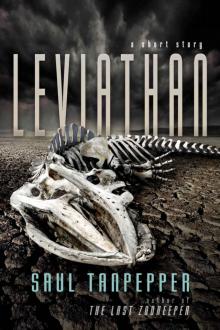 Leviathan: A Short Story About the End of the World
Leviathan: A Short Story About the End of the World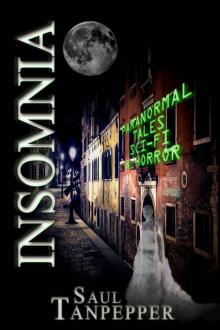 Insomnia: Paranormal Tales, Science Fiction, & Horror
Insomnia: Paranormal Tales, Science Fiction, & Horror Velveteen
Velveteen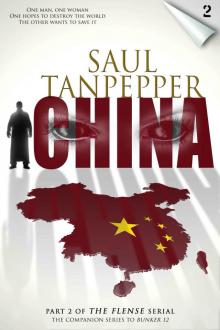 THE FLENSE: China: (Part 2 of THE FLENSE serial)
THE FLENSE: China: (Part 2 of THE FLENSE serial)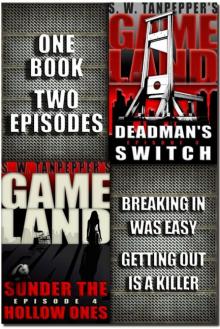 Deadman's Switch & Sunder the Hollow Ones
Deadman's Switch & Sunder the Hollow Ones